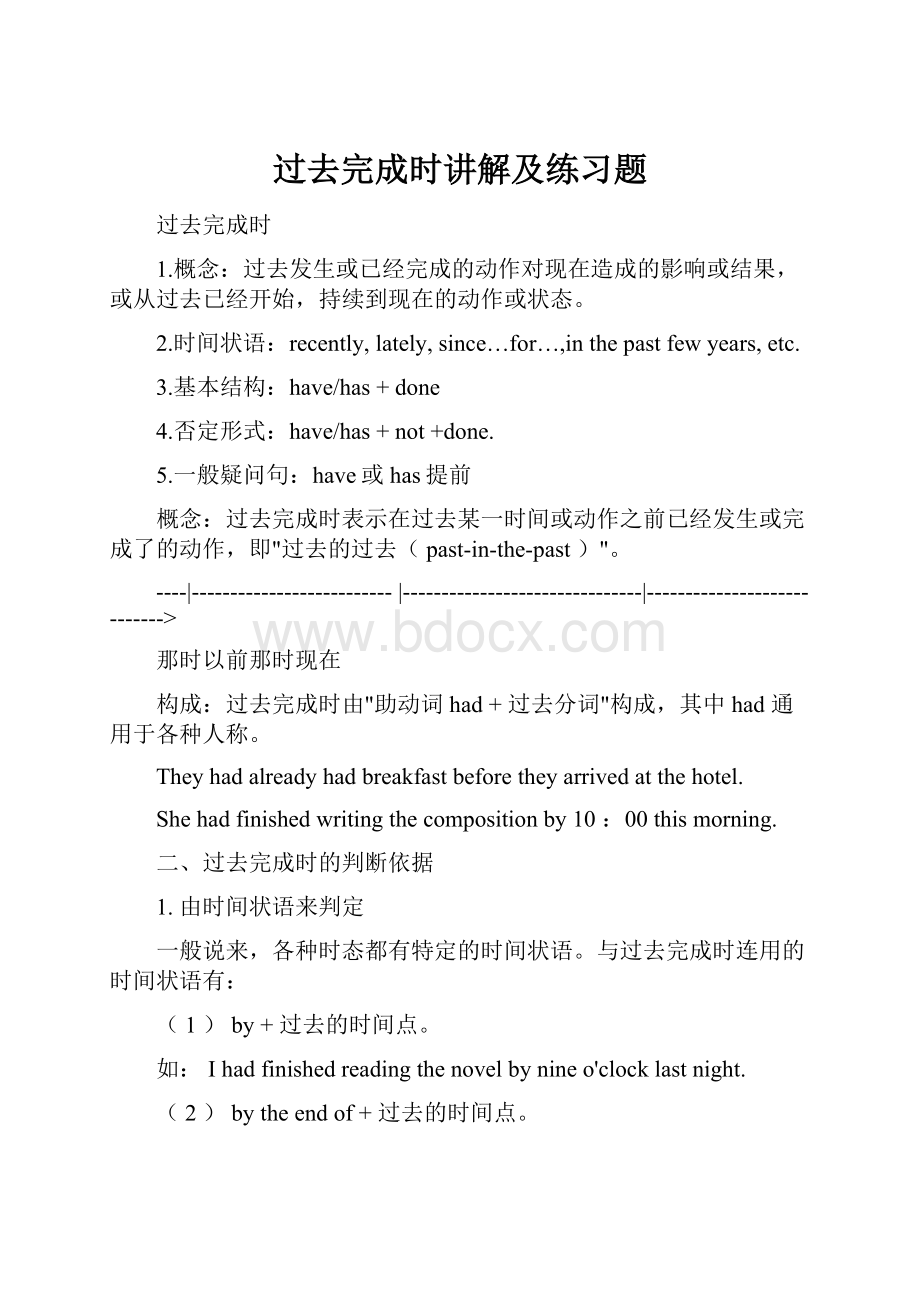 过去完成时讲解及练习题.docx
过去完成时讲解及练习题.docx
- 文档编号:28841846
- 上传时间:2023-07-20
- 格式:DOCX
- 页数:8
- 大小:18.33KB
过去完成时讲解及练习题.docx
《过去完成时讲解及练习题.docx》由会员分享,可在线阅读,更多相关《过去完成时讲解及练习题.docx(8页珍藏版)》请在冰豆网上搜索。

过去完成时讲解及练习题
过去完成时
1.概念:
过去发生或已经完成的动作对现在造成的影响或结果,或从过去已经开始,持续到现在的动作或状态。
2.时间状语:
recently,lately,since…for…,inthepastfewyears,etc.
3.基本结构:
have/has+done
4.否定形式:
have/has+not+done.
5.一般疑问句:
have或has提前
概念:
过去完成时表示在过去某一时间或动作之前已经发生或完成了的动作,即"过去的过去(past-in-the-past)"。
----|--------------------------|-------------------------------|---------------------------->
那时以前那时现在
构成:
过去完成时由"助动词had+过去分词"构成,其中had通用于各种人称。
Theyhadalreadyhadbreakfastbeforetheyarrivedatthehotel.
Shehadfinishedwritingthecompositionby10:
00thismorning.
二、过去完成时的判断依据
1.由时间状语来判定
一般说来,各种时态都有特定的时间状语。
与过去完成时连用的时间状语有:
(1)by+过去的时间点。
如:
Ihadfinishedreadingthenovelbynineo'clocklastnight.
(2)bytheendof+过去的时间点。
如:
WehadlearnedovertwothousandEnglishwordsbytheendoflastterm.
(3)before+过去的时间点。
如:
TheyhadplantedsixhundredtreesbeforelastWednesday.
2.由"过去的过去"来判定。
过去完成时表示"过去的过去",是指过去某一动作之前已经发生或完成的动作,即动作有先后关系,动作在前的用过去完成时,在后的用一般过去时。
这种用法常出现在:
(1)宾语从句中
当宾语从句的主句为一般过去时,且从句的动作先于主句的动作时,从句要用过去完成时。
在told,said,knew,heard,thought等动词后的宾语从句。
如:
Shesaidthatshehadseenthefilmbefore.
(2)状语从句中
在时间、条件、原因、方式等状语从句中,主、从句的动作发生有先后关系,动作在前的,要用过去完成时,动作在后的要用一般过去时。
如:
WhenIgottothestation,thetrainhadalreadyleft.
Afterhehadfinishedhishomework,hewenttobed.
注意:
before,after引导的时间状语从句中,由于before和after本身已表达了动作的先后关系,若主、从句表示的动作紧密相连,则主、从句都用一般过去时。
如:
Wheredidyoustudybeforeyoucamehere?
Afterheclosedthedoor,helefttheclassroom.
(3)表示意向的动词,如hope,wish,expect,think,intend,mean,suppose等,用过去完成时表示"原本…,未能…"
Wehadhopedthatyouwouldcome,butyoudidn't.
3.根据上、下文来判定。
ImetWangTaointhestreetyesterday.Wehadn'tseeneachothersincehewenttoBeijing.
三、过去完成时的主要用法
1.过去完成时表示一个动作或状态在过去某一时间或动作之前已经完成或结束,即发生在"过去的过去"。
如:
WhenIwokeup,ithadstoppedraining.
我醒来时,雨已经停了。
(主句的动作发生在"过去的过去")
2.过去完成时是一个相对的时态,表示的是"过去的过去",只有和过去某一时间或某一动作相比较时才使用它。
如:
Hetoldmethathehadwrittenanewbook.(hadwritten发生在told之前)
3.过去完成时需要与一个表示过去的时间状语连用,它不能离开过去时间而独立存在。
此时多与already,yet,still,just,before,never等时间副词及by,before,until等引导的短语或从句连用。
如:
BeforeshecametoChina,GracehadtaughtEnglishinamiddleschoolforaboutfiveyears.
Peterhadcollectedmorethan300Chinesestampsbythetimehewasten.
4.过去完成时表示某一动作或状态在过去某时之前已经开始,一直延续到这一过去时间,而且动作尚未结束,仍然有继续下去的可能。
如:
Bytheendoflastyear,hehadworkedinthefactoryfortwentyyears.(hadworked已有了20年,还有继续进行下去的可能)
四、过去完成时与现在完成时的区别
现在完成时表示的动作发生在过去,但侧重对现在产生的结果或造成的影响,与现在有关,其结构为"助动词have(has)+过去分词";过去完成时则是一个相对的时态,它所表示的动作不仅发生在过去,更强调"过去的过去",只有和过去某时或某动作相比较时,才用到它。
试比较:
Ihavelearned1000Englishwordssofar.
到目前为止我已经学会了1000个英语单词。
Ihadlearned1000Englishwordstillthen.
到那时为止我已经学会了1000个英语单词。
-I'msorrytokeepyouwaiting.对不起,让你久等了。
-Oh,notatall.Ihavebeenhereonlyafewminutes.
没什么,我只等了几分钟。
("等"的动作从过去某一时间点持续到现在)
-Johnreturnedhomeyesterday.约翰昨天回到家的。
-Wherehadhebeen?
他去哪儿了?
(答语中使用过去完成时是指约翰在returnedhome之前去了哪些地方,即"过去的过去")
五、过去完成时与一般过去时的区别
虽然这两种时态都表示过去发生的动作或存在的状态,但在使用时应注意以下几点:
1.时间状语不同:
过去完成时在时间上强调"过去的过去";而一般过去时只强调过去某一特定的时间。
试比较:
Theyhadarrivedatthestationbytenyesterday.
Theyarrivedatthestationattenyesterday.
2.在没有明确的过去时间状语作标志时,谓语动词动作发生的时间先后须依据上下文来判断:
先发生的用过去完成时,后发生的则用一般过去时。
如:
Shewasveryhappy.Herwholefamilywerepleasedwithher,too.Shehadjustwonthefirstinthecompositioncompetition.
3.当两个或两个以上接连发生的动作用and或but连接时,按时间顺序,只需用一般过去时来代替过去完成时;另外,在before,after,assoonas引导的从句中,由于这些连词本身已经表示出时间的先后,因此也可以用过去时来代替过去完成时。
如:
Heenteredtheroom,turnedonthelightandreadaneveningpaper
I(had)calledherbeforeIlefttheoffice.
过去完成时可表示过去未曾实现的想法和打算,通常连用的动词是want,think,hope,plan,mean,expect,intend,suppose等:
Ihadmeanttocome,butsomethinghappened.我本想来,但有事就没有来。
Ihadintendedtospeak,buttimedidnotpermit.我本想发言,但时间不允许。
Wehadhopedthatyouwouldcometoseeus,butyoudidn’t.我们本想你来看我们的,但你没有来。
过去完成时练习题
1.单项选择
1.Heaskedme_____duringthesummerholidays.
A.whereIhadbeenB.whereIhadgone
C.wherehadIbeenD.wherehadIgone
2.What____Jane____bythetimehewassever?
A.did,doB.has,doneCdid,did.D.had,done
3.I______900EnglishwordsbythetimeIwasten。
A.learnedB.waslearningC.hadlearnedD.learnt
4.She______livedherefor______years.
A.had,afewB.has,severalC.had,alotofD.has,agreatdealof
5.Bythetimemyparentsreachedhomeyesterday,I_____thedinneralready.
AhadcookedB.cookedC.havecookedD.wascooked
6.Shesaidshe__________theprinciplealready
A.hasseenB.sawC.willseeD.hadseen
7.Shesaidherfamily_______themselves______thearmyduringthewar.
A.hashidden,fromB.hadhidden,from
C.hashidden,withD.hadhidden,with
8.Bythetimehewastenyearsold,he_________.
A.hascompleteduniversityB.hascompletedtheuniversity
B.hadcompletedanuniversityD.hadcompleteduniversity
9.Shehadwrittenanumberofbooks______theendoflastyear.
A.forB.inC.byD.at
10.He_____toplay____beforehewas11yearsold.
Ahadlearned,pianoB.hadlearned,thepiano
C.haslearned,thepianoD.learns,piano.
11.What_______Annie____bythetimehewasten?
A.did,doB.did,didC.has,doneD.haddone
12.He___inthefactoryforthreeyearsbeforehejoinedtheArmy.
A.hasworkedB.worksC.hadworkedD.willwork
13.Bytheendoflastweek,they____thebridge.
A.hascompletedB.completedC.willcompleteD.hadcompleted
14.Benhatesplaying_____violin,buthelikesplaying____football.
A.a…theB.the…theC./…theD.the…/
15.Bythetimehewas4,he______alotofGermanwords.
A.hadlearnedB.haslearnedC.learnedD.learns
16.Jimturnedoffthelightsandthen_____theclassroom.
A.wasleftB.hadleftC.hasleftD.left
17.They_________inGuangzhousince2000.
A.livedB.hadlivedC.havelivedD.wereliving
18.ThetrainfromBeijing_______tenminutesago.
A.hasarrivedB.wasarrivingC.arrivedD.hadarrived
19.Thestudents_________theirclassroomwhenthevisitorsarrived.
A.havecleanedB.hadcleanedC.wascleanedD.havebeencleaned
20.Fergie_______theprojectinonehour.
A.havefinishedB.willfinishC.finishesD.hasfinished
21.Theman________hiscoatandwentout.
A.putonB.hadputonC.willputonD.wasputtingon
22Mymother______inthatfactoryattheageof18.
A.hadworkedB.hasworkedC.workedD.works
23.Dad________whilehe_______TV.
A.fellasleep…watchB.wasfallingasleep…watched
C.fellasleep……waswatchingD.hadfallenasleep…watched
2.用动词的适当形式填空
1.We_____________(paint)thehousebeforewe______________(move)in.
2.Thatricholdman_____________(make)awillbeforehe_____________(die).
3.They_____________(study)themapofthecountrybeforethey________(leave).
4.Therobbers_____________(runaway)beforethepolicemen_______(arrive).
5.I__________(turnoff)allthelightsbeforeI____________(go)tobed.
6.Paul__________(go)outwithJaneafterhe__________(make)aphonecall.
7.Tom__________(say)he___________(read)thebooktwice.
8.Ourplan____________(fail)becausewe_____________(make)abadmistake.
9.Whenthechairman______________(finish)speaking,he_____________(leave)thehall.
10.TheReads________(have)lunchwhenI________________(get)totheirhouse.
11.WhenI______________(arrive)atthestation,he____________________(leave).
12..We_______________(learn)about4000Englishwordsbytheendoflastterm.
13.Iwaiteduntilhe_______________(finish)hishomework.
14.Weweresurprisedatwhatshe________already______(do)
15.She____________(notgo)toQingdaobecauseshe________________(go)therebefore.
16.He______________(nottell)youthenewsyet.
17.Hesaidhe_____________already_________(give)thebooktotheteacher.
18.I______________(be)toShanghaibefore.
19.Shetoldmeshe_________________(be)toSanyathreetimes.
20.She_____________(play)theguitarwhilehersister_______________(sing).
- 配套讲稿:
如PPT文件的首页显示word图标,表示该PPT已包含配套word讲稿。双击word图标可打开word文档。
- 特殊限制:
部分文档作品中含有的国旗、国徽等图片,仅作为作品整体效果示例展示,禁止商用。设计者仅对作品中独创性部分享有著作权。
- 关 键 词:
- 过去完成时 讲解 练习题
 冰豆网所有资源均是用户自行上传分享,仅供网友学习交流,未经上传用户书面授权,请勿作他用。
冰豆网所有资源均是用户自行上传分享,仅供网友学习交流,未经上传用户书面授权,请勿作他用。


 《贝的故事》教案4.docx
《贝的故事》教案4.docx
